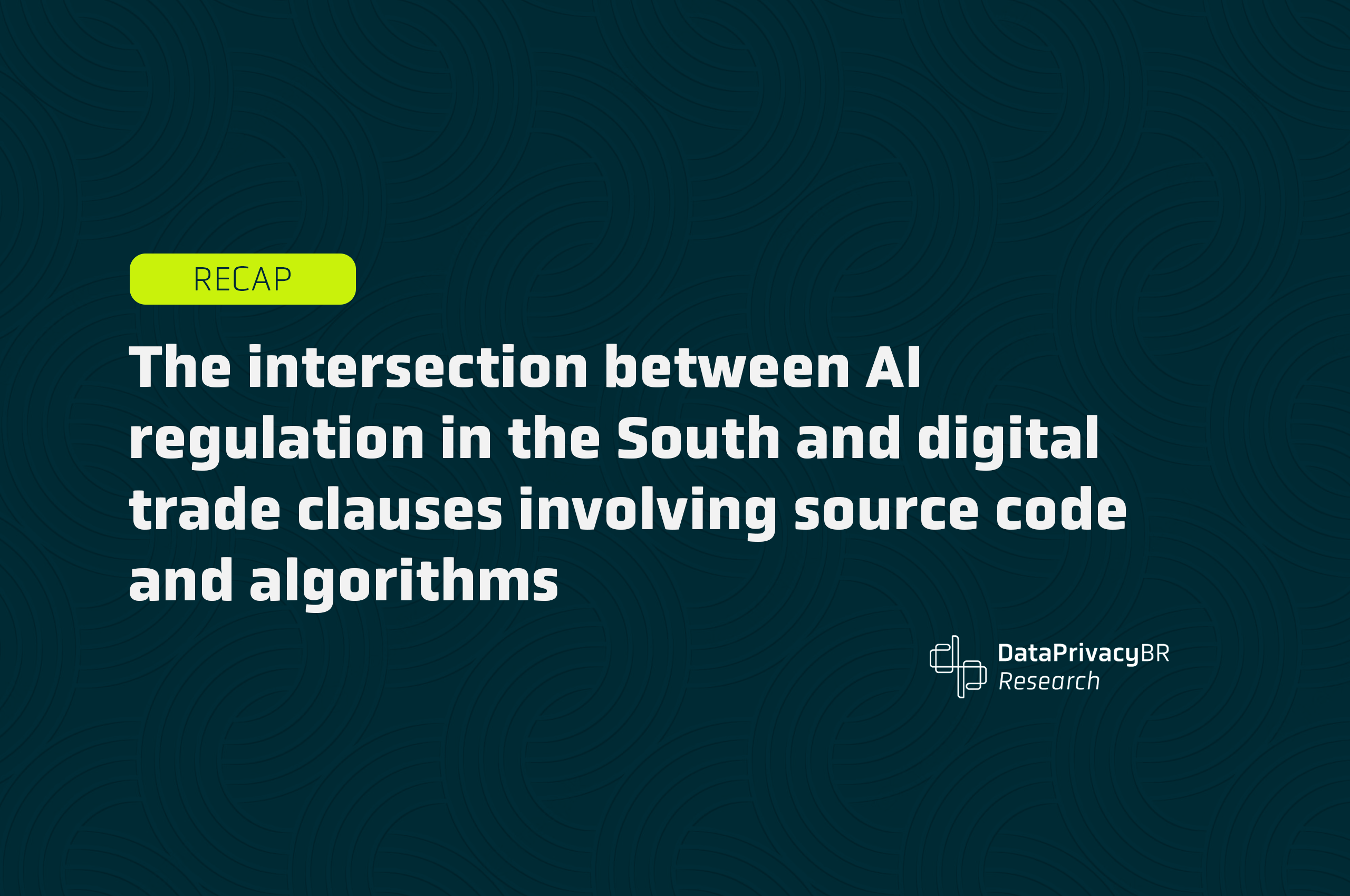The intersection between AI regulation in the South and digital trade clauses involving source code and algorithms
Recap of Session 43 of the WTO’s 2023 Public Forum organized by Data Privacy Brasil and REBRIP
On September 14th 2023, the panel ‘’Unveiling Trade Secrets: Exploring the Implications of trade agreements for AI Regulation in the Global South’’, organized by Data Privacy Brasil and REBRIP, took place during the 2023 WTO Public Forum, whose overall goal was to examine how trade can contribute to a greener and more sustainable future. Considering both the potentials and risks of Artificial Intelligence, as well as the prevalence of broader debates on AI governance and regulation, this panel’s goal was to discuss the concrete implications of particular trade clauses on the abilities of governments to regulate and require meaningful algorithmic accountability.
A debate that has been gaining traction in Europe and the US, as parties to agreements that include such clauses, its potential impacts on South countries that are in the process of developing their own domestic legal frameworks to regulate AI and algorithmic are still unclear. The panel brought together Mariana Rielli, director of Data Privacy Brasil, Sofía Scasserra, Director of Observatorio de Impactos Sociales de IA, Transnational Institute, and Deborah James, Director of International Programs, Center for Economic and Policy Research. It was moderated by Melanie Foley, Global Trade Watch Deputy Director. This blog compiles the notes from the panel, altered only for consistency and style, so that the main takeaways of this discussion can be shared widely.
Melanie Foley explained that Public Citizen is a U.S. consumer advocacy organization and a member of the Digital Trade Alliance, a network of more than a dozen organizations working for digital rights in the trade space. She opened by asking attendees in the packed room to raise their hands if they had ever used Chat GPT or a similar AI program. Nearly all did, so they are likely all aware, she explained, that algorithms don’t just decide the next song you’ll hear on a streaming service. They’re already a huge part of modern society and will only continue expanding into more and more facets of our lives. They’re increasingly making decisions about access to jobs and housing, health care, prison sentencing, educational opportunities, insurance rates and lending, deployment of police resources, and much more.
However, software can be programmed to serve illicit purposes or can have unintended consequences. We are only beginning to understand the various harms that can occur due to the use of AI tools — which may range from replicating and exacerbating discrimination or biases to expropriating and misusing consumer data. It’s reasonable that governments may want to review these groundbreaking tools before they are released to an unsuspecting public. Despite this, certain provisions that are being proposed in some trade pacts, and that have already been agreed to in others, conflict with governments’ attempts to access and verify the source code used in various products to prevent racial and gender discrimination or other harms.
She then introduced Deborah James and asked her to give some specifics on the risky trade rules we’re here to discuss, and to explain where the tech industry has been most successful thus far in advancing its agenda.
Deborah James laid out a comprehensive overview of this particular debate.
AI, as James pointed out, relies on data, and Big Tech companies engage in extensive data collection, through surveillance, or by purchasing data or acquiring other companies. An algorithm, in its turn, tells the computer what to look for in the data, and what decisions to make based on what it finds. Those algorithms are based on the underlying source code.
The significance of regulating AI becomes abundantly clear in light of its potential to influence democracy, human rights, racial justice, labor rights, etc. Presently, many AI-related decisions remain hidden within a “Black Box,” granting tech companies the power to evade accountability for their algorithmic choices. This opacity raises concerns about the erosion of fundamental principles of democratic societies.
Furthermore, the tech sector stands as one of the most lucrative yet least regulated industries in history. Big Tech companies have consistently opposed regulation, both in the US and elsewhere, often raising objections that it would stifle innovation or harm consumers themselves. James drew attention to the fact that this strategy also applies to the intersection of AI and international trade agreements, highlighting that Big Tech has actively lobbied trade ministries to incorporate policies that protect their profit models. They call for the inclusion in trade agreements of provisions that would bar governments from being able to require the disclosure of source code and data in trade agreements. Big Tech seeks to use “trade” agreements because they are binding and they sideline democratic debates which are occurring worldwide about the role of these corporations in society.
Of particular concern is the attempt to enshrine secrecy regarding source code and data in these trade agreements, effectively curtailing governments’ ability to require meaningful algorithmic transparency and accountability. James further emphasized that these proposals are crafted to serve the interests of Big Tech corporations, both in developed and developing countries. They aim to convince the global South that these rules are beneficial and aimed at development, despite their clear alignment with corporate interests who have no mandate or expertise on development.
In response to the argument that proposed exceptions in these agreements would be enough, she highlighted that the history of trade tribunal indicates a propensity to prioritize commercial interests over public interest and human rights, casting doubt on the efficacy of relying solely on such exceptions. The reasons stated are threefold: first, these exceptions are aimed at regulators and ex-post judicial enforcement; second, exceptions for many other social ills that are often a result of algorithmic bias, such as false information, emotional manipulation, and others raised by consumer advocacy organizations, do not appear in the text. Lastly, the exceptions contemplate, however insufficiently, only known risks of AI systems.
As new risks and harms become known, it will be even more important for governments to maintain the power to regulate such algorithms to ensure that human and fundamental rights are upheld and that harms to society are reduced.
This would ultimately empower trade unions, civil society, and technical experts to scrutinize and assess algorithmic decisions, particularly in cases involving labor disputes and potential violations of human rights.
In summary, Deborah James stressed the pressing need for transparency and comprehensive regulation of AI, cautioning against trade agreements that prioritize the interests of Big Tech at the expense of accountability and democratic values.
In Latin America, there’s a noticeable shift in perspective towards the significance of regulating artificial intelligence (AI) and data flows, particularly considering the importance of ensuring diversity and representation in the data that fuels those systems.
Sofía Scasserra provided a brief overview of several movements in the region and how those relate to trade. She pointed out the growing realization that, while fostering technological advancements is essential, it’s equally crucial to protect regional interests, which includes retaining control over data generated within the respective regions.
At the same time, Scasserra pointed out that the region itself is very heterogeneous, including when it comes to the maturity of these debates and of actual enforceable regulation of data flows and digital rights, which is currently in place in some countries, like Brazil and Argentina, but not in others, like Paraguay and Bolivia. Still, concerns over not just regulating AI, but ‘’getting it right’’, so that it serves the interests of the region and its people, are already prominent.
So, a one-size-fits-all approach won’t suffice, as there’s a pressing need for comprehensive policies that take into account the unique challenges and priorities of each region, which in its turn requires time. These policies should extend beyond privacy concerns to encompass broader issues like environmental impact, labor rights, and collective rights, connections that are already explicit across Latin America due to its history and sociolegal contexts.
As an example, Scasserra mentioned how algorithms that dictated food delivery workers schedules required them to be constantly moving around cities in Colombia in order to be assigned gigs. That led to a number of unintended consequences, such as environmental damage and increased dangers and hazards for the workers themselves, who managed to effect change regarding these practices through organized protest. This, according to the expert, is one example of how the state might have proactively sought the details about the algorithm for prior evaluation, rather than reacting after significant harm had already occurred.
Then, Scasserra turned to the interplay between all these movements in Latin America and the (digital) trade agenda in the region, an area that is also highly heterogeneous. For instance, the Trans-Pacific Partnership (TPP) features an assertive digital chapter that restricts access to domestically produced data and forbids requests for accessing source code.
Conversely, the Mercosur countries lack Free Trade Agreements (FTAs) with comprehensive digital trade provisions, as seen in the Pacific region, but this possibility seems to be gaining traction. In the event that these FTAs are signed, she argues, regulating AI to protect diverse Latin American societies will pose considerable difficulties.
Scasserra concluded by reminding the panel, once again, that Latin America has significant potential for crafting solutions to regional challenges, including regarding AI, but that in order for that to be realized and not constrained by opaque trade clauses, there needs to be policy space for regulation, as well as time to develop these regulations and foster local technological advancements that facilitate the region’s goals.
Mariana Rielli started by introducing Data Privacy Brasil, which, along with numerous other organizations, has been diligently working to bridge the gap between individuals concerned about digital rights and privacy and traditional trade-focused organizations. Brazil has established a robust civil rights framework for the Internet in 2014 and a data protection law in 2018, both of which were crafted with inputs from a diverse range of stakeholders. Within Brazil, there exists a vibrant digital rights community that is actively addressing the unequal impacts of datafication, both domestically and across regions.
However, there is a notable disconnect between these important democratic debates on digital rights and the (digital) trade agenda, which often operates opaquely and is challenging for Brazilian CSOs to access or comprehend. This dissonance brings out concerns for the harmony of Brazil’s own regulatory landscape, current and future.
Brazil is currently in the process of regulating AI systems, a journey that has spanned the last two years. A committee of experts, supported by multi-stakeholder groups and extensive public engagement, has drafted a comprehensive framework for AI regulation. This legislation is not merely a copy-paste of European models but is firmly rooted in Brazil’s constitutional principles, especially data protection as a fundamental right, and adopts a rights-based approach with elements of risk to modulate the intensity of certain obligations and governance measures.
As such, it provides for a number of algorithmic accountability measures, both in terms of ex-post enforcement and ex-ante requirements focused on active transparency, information, impact assessments, etc.
With that context in mind, one significant concern lies in the provisions within trade agreements that restrict the disclosure of source code, including both algorithms and APIs. These restrictions can directly impact the ability to enforce algorithmic accountability measures outlined in AI regulation such as the one on the table in Brazil. While transparency and accountability do not always necessitate direct access to source code, the current breadth of trade provisions might even extend to the interface level.
While Brazil is not currently party to mega-regional trade agreements with source code protection provisions, there is growing pressure to join. Brazil has shifted its stance from a historically defensive position to align more closely with the digital trade agenda initiated by the United States and it remains to be seen how that position will play out in the future, as such a stance could be considered incompatible with its bold steps in regulating AI with multi-layered provisions. If Brazil were to sign one of these trade agreements, it could potentially hinder the full implementation of its ambitious AI regulations, creating a significant challenge in balancing digital rights and international trade interests.
Discussion
Two questions from the floor led to the final discussion of the panel. The first was about the differences between a right-based and a risk-based approach to AI regulation. Both James and Rielli explored the question, highlighting that a focus on rights provides a baseline of protection and shifts the onus to AI systems providers to provide information to users and to be generally accountable beforehand, as opposed to relying solely on ex post enforcement. The second question was about the implications of those discussions, in general, to second-generation rights (social, economic and cultural).
In response, Scasserra reflected on how regulation is always ‘’late’’ and, for AI, the implications are still heavily unknown, so that these processes must pay attention not only to existing and potential impacts on individual rights, such as privacy, but also collective rights. Rielli concurred, and added that, despite common narratives, the impacts of AI are not distant, rather they are already very concrete, and many of them connected to second-generation rights, like housing, health, education, etc. James wrapped up the panel going back to her original point about the importance of the underlying data and who owns that, also highlighting the centrality of digital infrastructure and industrialization to counter the many asymmetries discussed throughout the panel.
Veja também
-
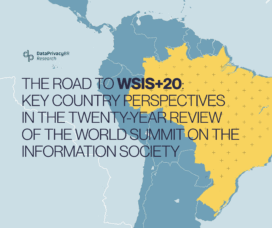
The Road to WSIS+20: Key Country Perspectives in the Twenty-Year Review of the World Summit on the Information Society
This report aims to support engagement in the WSIS+20 process by providing insight into the positions and priorities of selected governments.
-
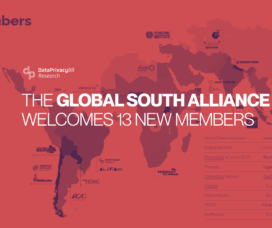
The Global South Alliance welcomes 13 new members
The Global South Alliance is a coalition formed in 2022 with the mission of unifying NGOs dedicated to the promotion of mutual learning and the advancement of digital rights with a perspective from the Global South. In May, the Global South Alliance welcomed 13 new members, reaching the total number of 26 organisations.
-

Job Opening: Digital Librarian
The Data Privacy Brasil makes the notice public with registrations until July 11th.
-
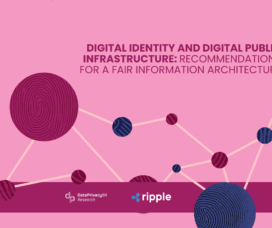
Report | Digital Identity and Digital Public Infrastructure: recommendations for a fair information architecture
Data Privacy Brasil launches its new report entitled “Digital Identity and Digital Public Infrastructure: recommendations for a fair information architecture”. The study examines the impact of a Digital Public Infrastructure (DPI), especially digital identity applications, on the protection of personal data in light of the Brazilian Federal Constitution (CF) and the General Data Protection Law (LGPD).
-

Five-Point Plan for an Inclusive WSIS+20 Review
As stakeholders engaged in the WSIS+20 Review process, organizations sign the petition presenting recommendations to help operationalize the WSIS+20 review modalities in order to ensure transparency, inclusion, and meaningful stakeholder engagement.
-
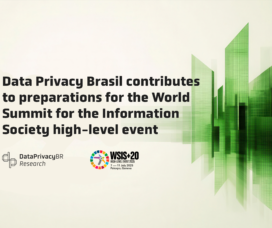
Data Privacy Brasil contributes to preparations for the World Summit for the Information Society high-level event
The event, which is co-organized by the ITU, UNESCO, UNDP, and UNCTAD, takes place in July, and this March, stakeholders were able to send their suggestions regarding the format and content to be debated, especially in light of the review process.
-

Data Privacy Brasil goes to the Digital Rights and Inclusion Forum (DRIF)
For the third consecutive year, Data Privacy Brasil will participate in the Digital Rights and Inclusion Forum (DRIF). DRIF – formerly known as the Internet Freedom Forum (IFF) – is an annual forum organized by Paradigm Initiative (PIN), since 2013, to be a space for discussions on global issues related to digital rights and inclusion.
-
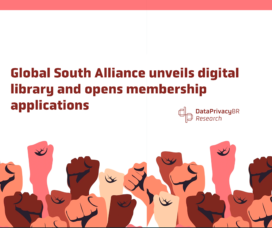
Global South Alliance unveils digital library and opens membership applications
The GSA invites organizations to express their interest in joining the network by completing the application form available until April 24.
Veja Também
-

The Road to WSIS+20: Key Country Perspectives in the Twenty-Year Review of the World Summit on the Information Society
This report aims to support engagement in the WSIS+20 process by providing insight into the positions and priorities of selected governments.
-

Job Opening: Digital Librarian
The Data Privacy Brasil makes the notice public with registrations until July 11th.
-

Report | Digital Identity and Digital Public Infrastructure: recommendations for a fair information architecture
Data Privacy Brasil launches its new report entitled “Digital Identity and Digital Public Infrastructure: recommendations for a fair information architecture”. The study examines the impact of a Digital Public Infrastructure (DPI), especially digital identity applications, on the protection of personal data in light of the Brazilian Federal Constitution (CF) and the General Data Protection Law (LGPD).
-

Five-Point Plan for an Inclusive WSIS+20 Review
As stakeholders engaged in the WSIS+20 Review process, organizations sign the petition presenting recommendations to help operationalize the WSIS+20 review modalities in order to ensure transparency, inclusion, and meaningful stakeholder engagement.
-

Data Privacy Brasil contributes to preparations for the World Summit for the Information Society high-level event
The event, which is co-organized by the ITU, UNESCO, UNDP, and UNCTAD, takes place in July, and this March, stakeholders were able to send their suggestions regarding the format and content to be debated, especially in light of the review process.
-

Data Privacy Brasil goes to the Digital Rights and Inclusion Forum (DRIF)
For the third consecutive year, Data Privacy Brasil will participate in the Digital Rights and Inclusion Forum (DRIF). DRIF – formerly known as the Internet Freedom Forum (IFF) – is an annual forum organized by Paradigm Initiative (PIN), since 2013, to be a space for discussions on global issues related to digital rights and inclusion.
-

Global South Alliance unveils digital library and opens membership applications
The GSA invites organizations to express their interest in joining the network by completing the application form available until April 24.
-
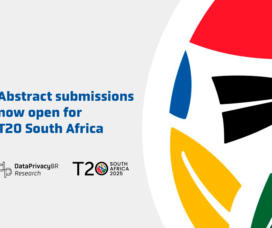
Abstract submissions now open for T20 South Africa
The Think20 South Africa invites researchers from around the world to contribute to a dynamic exchange of ideas on today's most pertinent challenges. The deadline for submitting abstracts is February 10, 2025.
-
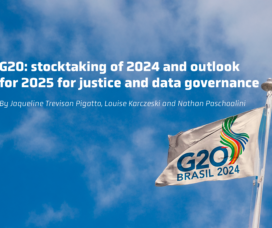
G20: stocktaking of 2024 and outlook for 2025 for justice and data governance
In 2024, Data Privacy Brasil took on a new and exciting challenge: participating in the G20 ecosystem, during the Brazilian presidency, through the official engagement group for think tanks, Think 20 (T20). Check out the text to learn more about Data's work at the G20.
-
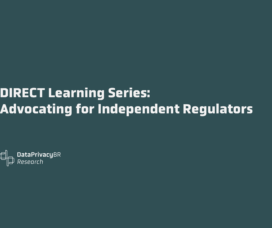
DIRECT Learning Series: Advocating for Independent Regulators
The 6th workshop took place on November 6th, 2024, in the context of the Data Rights and Enforcement through Community Trust (DIRECT) Learning Series, an ongoing thematic series of workshops with members of the DIRECT consortium, supported by Internews.
-
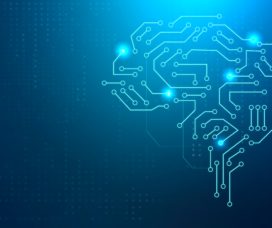
Exploring Opportunities in the Digital Economy and AI at the G20
The task force 5 of T20 Brasil has engaged several international think tanks to provide ideas and policy proposals on crucial areas of technological development, such as AI and Digital Public Infrastructures. This includes encouraging G20 nations to adopt policies that protect individual rights while fostering innovation.
-

DIRECT Learning Series: data protection training and capacity building
The 5th workshop took place on October 2nd, 2024, in the context of the Data Rights and Enforcement through Community Trust (DIRECT) Learning Series, an ongoing thematic series of workshops with members of the DIRECT consortium, supported by Internews.
-
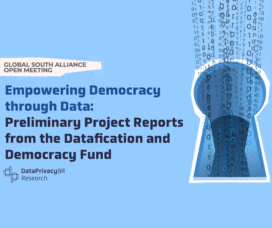
Empowering Democracy through Data: preliminary project reports from the DDF
The Global South Alliance wil host its next open meeting on October 22, 2024, where grantees from the first cohort of the Datafication and Democracy Fund (DDF) will present their impactful research.
-

Protean acknowledged for leadership in digital public infrastructure
A report from Data Privacy Brasil underscores how DPI can be leveraged to create environments where data privacy and security are prioritized.
-
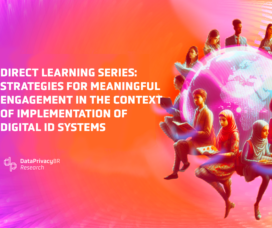
DIRECT Learning Series: strategies for meaningful engagement in the context of implementation of Digital ID systems
This workshop took place on August 28th, 2024, in the context of the Data Rights and Enforcement through Community Trust (DIRECT) Learning Series, an ongoing thematic series of workshops with members of the DIRECT consortium, supported by Internews.
-
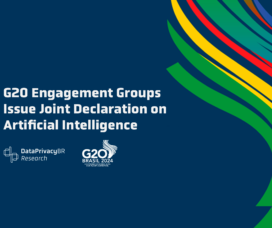
G20 Engagement Groups Issue Joint Declaration on Artificial Intelligence
On Tuesday (10), the main G20 engagement groups, including Civil 20 (C20), Labor 20 (L20), Think 20 (T20) and Women 20 (W20), announced a groundbreaking joint statement on the ethical, sustainable and inclusive development and deployment of artificial intelligence (AI).
-
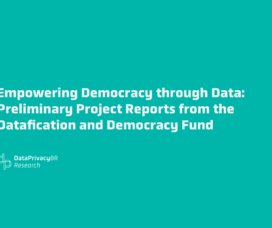
Empowering Democracy through Data: Preliminary Project Reports from the Datafication and Democracy Fund
The Global South Alliance held its first meeting with the organizations covered by the Datafication and Democracy Fund. On the occasion, each of the five organizations - Like a Palm Tree (Africa), Center of Security and Citizenship Studies (LatAm), Corporación Cambio Sostenible (LatAm), Criminal Justice & Policy Accountability Project (India), and Ikigai Innovation Initiative (Africa) - had the opportunity to present the preliminary results of their projects and hear feedbacks from the GSA members.
-
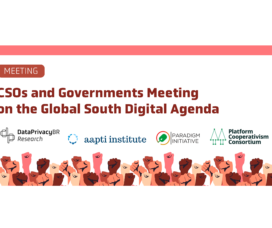
CSOs and Governments Meeting on the Global South Digital Agenda
On September 21st and 24th, the event “Open Dialogue: Global South Alliance and Governments for an Inclusive Digital Agenda” will take place, promoted by the organizations Data Privacy Brasil, Aapti Institute, Paradigm Initiative and PCC (The New School). The event aims to provide an open conversation with diplomats about the international agenda for IPRs, AI, GDC implementation and G20 continuity.
-
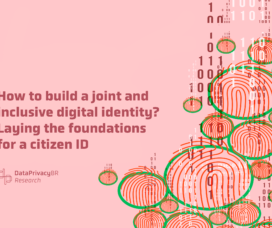
How to build a joint and inclusive digital identity? Laying the foundations for a citizen ID
Do you know what an identity is? Thinking about facilitating access to the topic, Data Privacy Brasil has developed a series of content to provide the foundations and tools possible for all the details on the subject. With this, we will be able to discuss, as a community, what we want with a digital identity and how we can achieve it.
-
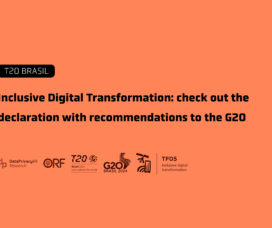
Inclusive Digital Transformation: check out the declaration with recommendations to the G20
In the document, six priorities were defined to deal with issues such as digital inclusion and meaningful universal connectivity; and challenges, opportunities and governance of artificial intelligence.
-
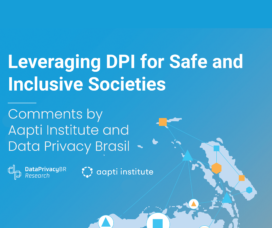
Leveraging DPI for Safe and Inclusive Societies
Aapti and Data Privacy Brasil have submitted their contribution to the Office of the United Nations Secretary-General's Envoy on Technology (OSET) and the United Nations Development Programme (UNDP) regarding the report "Leveraging DPI for Safe and Inclusive Societies".
-
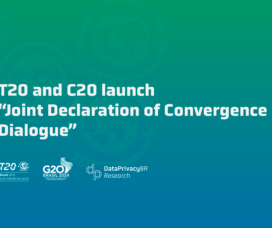
T20 and C20 launch “Joint Declaration of Convergence Dialogue”
On the 2nd and 3rd of July, a Mid-Term Conference took place in Rio de Janeiro, a T20 event with the participation of leaders from national and international think tanks, members of academia, representatives of the private and public sectors and civil society to discuss and propose solutions to the main global challenges.
-

Datafication and Democracy Fund welcomes five organizations from the Global South for short-term projects
The Datafication and Democracy Fund Committee, composed of Data Privacy Brasil, Paradigm Initiative, and Aapti Institute, is pleased to announce the five organizations awarded funding for a short-term research project.
-
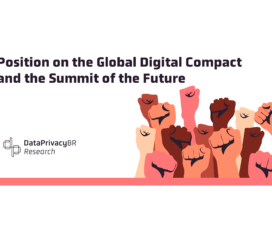
Position on the Global Digital Compact and the Summit of the Future
Between the 9th and 10th of May, the UN Civil Society Conference is happening in Nairobi. The event is presented as an opportunity to engage civil society in preliminary discussions ahead of the Summit of the Future.
-
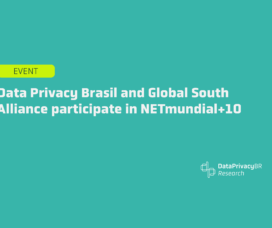
Data Privacy Brasil and Global South Alliance participate in NETmundial+10
Between April 29th and 30th, the NETmundial+10 took place in São Paulo. Building upon the event and the NETmundial Declaration of 2014, this event focused on strengthening global multistakeholder governance for the Internet and digital technologies, as well as conveying messages to global actors for better coordination of various ongoing processes.
-
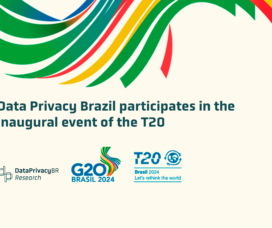
Data Privacy Brazil participates in the inaugural event of the T20
Between March 4th and 6th, the Organizing Committee of T20 Brazil - composed of CEBRI, FUNAG, and IPEA - held the first official event of the engagement group. The event took place entirely virtually and was openly broadcast to the public.
-

Inclusive Digital Transformation in the T20
The year 2024 marks Brazil's presidency in the G20, the group of the world's largest economies, chaired by our country for the first time. It is a year of great opportunity for Brazil to influence a broad global governance agenda, prioritizing issues such as inequality, climate change, and, of course, digital transformations.
-
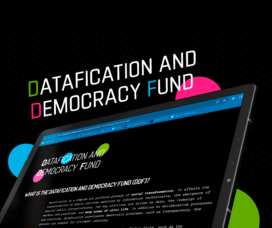
Data Privacy Brasil, Paradigm Initiative and Aapti Institute announce the launch of the “Datafication and Democracy Fund”
The fund aims to finance activities that strengthen the work of NGOs in the Global South on issues of datafication and democracy
-
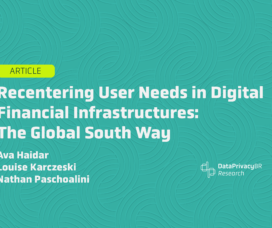
Recentering User Needs in Digital Financial Infrastructures: The Global South Way
Through India’s G20 leadership in 2023, global agendas of digital transformation and financial growth have come to be intimately reoriented to challenges, priorities and special developments in the Global South.
-

At UNCTAD eWeek, Data Privacy Brasil will discuss the intersection between digital economy and human rights in AI regulation
The UNCTAD eWeek, an initiative of the United Nations Conference on Trade and Development (UNCTAD) in partnership with eTrade for all, will occur from the 4th until the 8th of December.
-
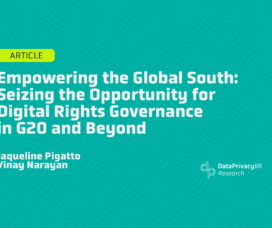
Empowering the Global South: Seizing the Opportunity for Digital Rights Governance in G20 and Beyond
The G20 represents a critical policy space for addressing emergent challenges on a global scale and its importance as a platform is pronounced when we consider its significance for the Global South.
-
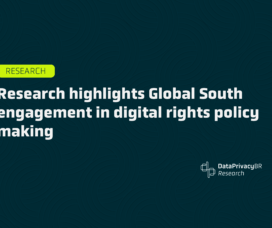
Research highlights Global South engagement in digital rights policy making
The Data Privacy Brasil Research Association announces the launch of the research report on Global South perspectives on international engagement in digital rights.
-
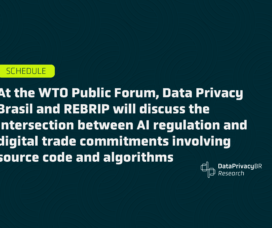
At the WTO Public Forum, Data Privacy Brasil and REBRIP will discuss the intersection between AI regulation and digital trade commitments involving source code and algorithms.
The WTO Public Forum 2023 will take place between September 12th and 15th in Geneva.
-

Data Privacy Brasil’s contribution to the Thematic Deep Dive of Artificial Intelligence and other Emerging Technologies of the Global Digital Compact
As other civil society organizations already pointed out, notable preference was given to the speech of Member States, UN agencies, and the private sector, at the expense of human rights civil society organizations, which prevented the speech that had been prepared by the DBPR and other civil society stakeholders.
-
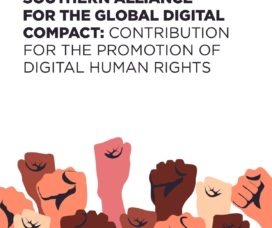
Southern Alliance for the Global Digital Compact
Responding to the call made by the United Nations, the Data Privacy Brazil Research Association, together with organizations from the Global South, presents a contribution to the Global Digital Compact.
-

Data Privacy Brasil Research Association contributes to UN open call on the relationship between human rights and technical standard-setting processes
We received a call as an opportunity to submit suggestions to inform the OHCHR report on the relationship between human rights and standard-setting processes for new and emerging digital technologies.
-
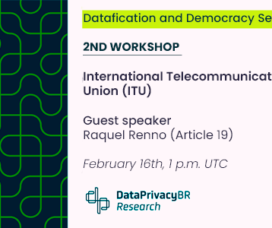
Our second workshop of a series about technical forum talks about the International Telecommunications Union
In the second meeting of the Datafication and Democracy Workshop Series, we received Raquel Renno, Digital Programme Officer of Article 19, who spoke about the International Telecommunication Union (ITU) for third sector organizations.
-
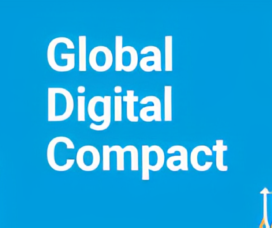
Let’s stay tuned for the Global Digital Compact
What is the Global Digital Compact and why is it important to keep an eye on it?
-

Why should we all pay attention to the Brazilian Digital ID system?
The implementation of digital identity systems is increasing around the world, especially in Global Southern countries. The model widely adopted is known as Big ID, promoted by or linked to public administration bodies which use centralized biometric databases to identify and authenticate citizens (Access Now, 2021).
DataPrivacyBr Research | Content under licensing CC BY-SA 4.0

